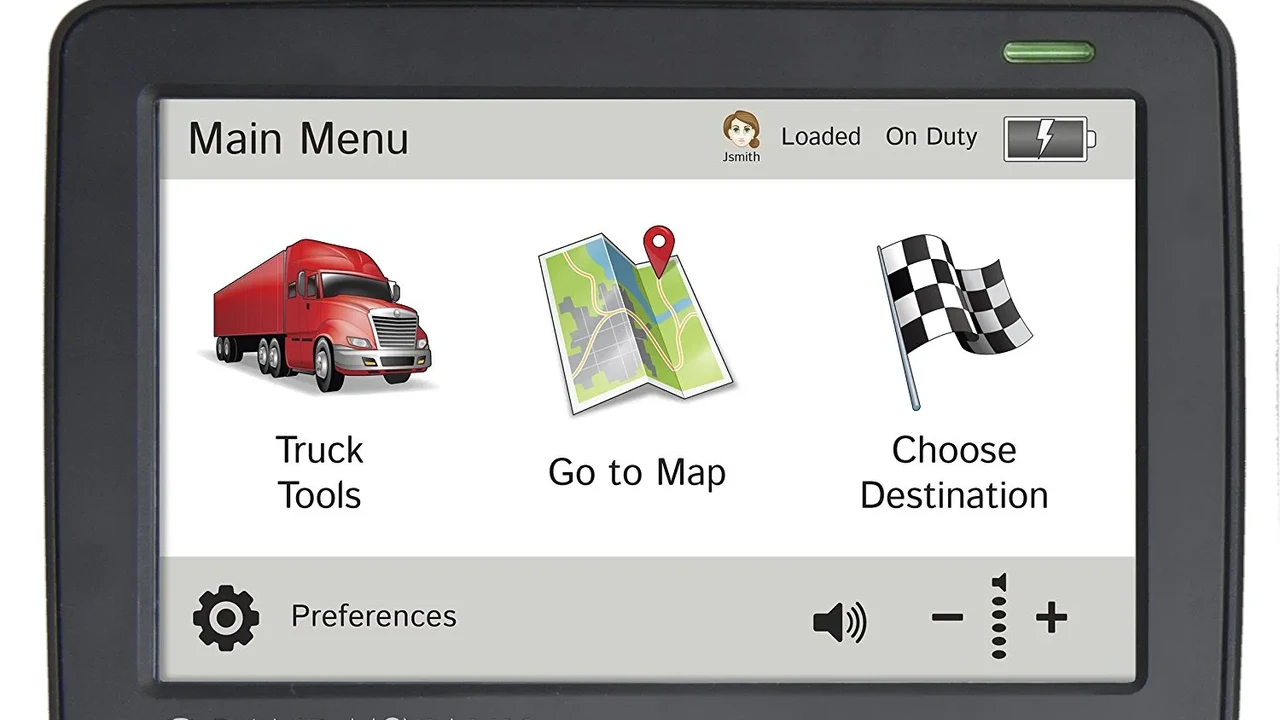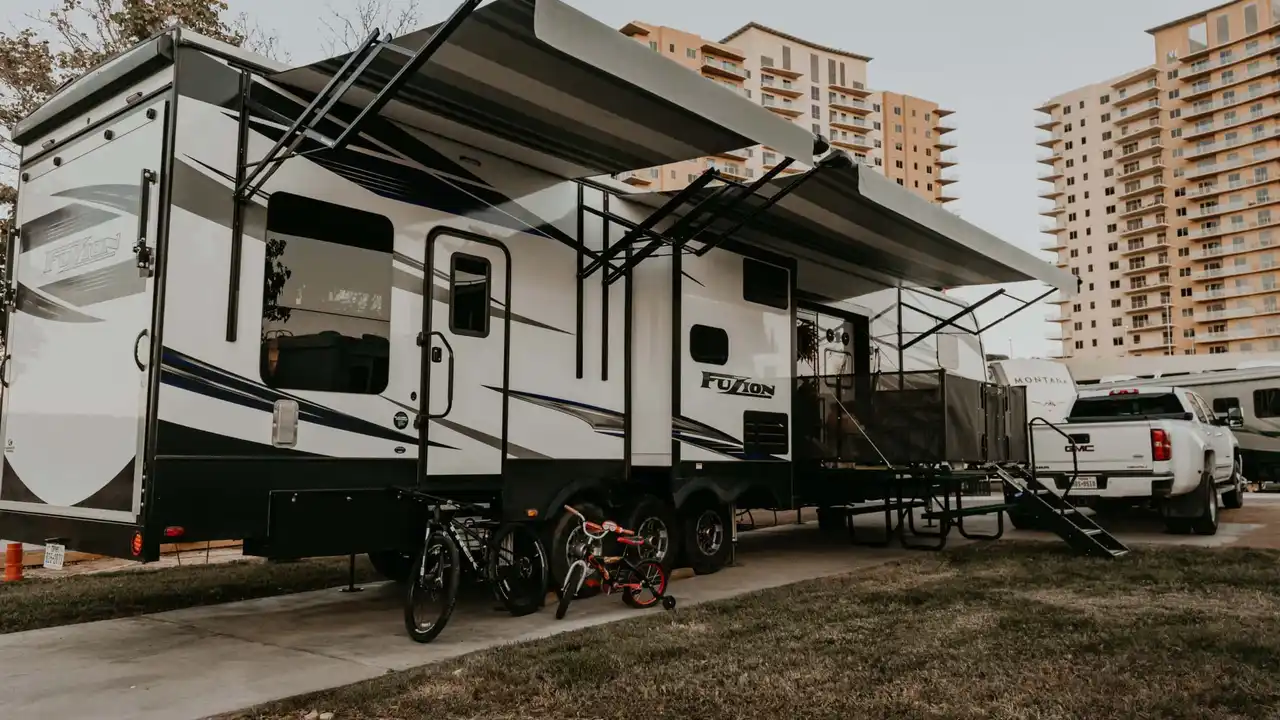RV GPS Navigation: Finding the Best Routes

Understanding RV GPS Navigation Systems The Importance of Accurate Routing
Navigating the open road in your RV is an adventure, but it can quickly turn stressful without proper planning and the right tools. One of the most essential tools for any RVer is a reliable GPS navigation system. But why is it so crucial, and what makes a GPS system specifically designed for RVs different from your standard car GPS?
First and foremost, RV GPS systems are designed to take into account the unique challenges faced by RVs. These challenges include:
* **Vehicle Size and Weight Restrictions:** RVs are significantly larger and heavier than passenger vehicles. Standard GPS systems often don't consider bridge heights, weight limits, and narrow roads that can be impassable for larger vehicles. An RV GPS will guide you around these obstacles, preventing costly damage and dangerous situations. * **Propane Restrictions:** Some tunnels and bridges prohibit vehicles carrying propane. An RV GPS can route you around these restricted areas, ensuring your safety and compliance with regulations. * **Low Clearances:** Low-hanging branches, overpasses, and other obstacles can damage your RV's roof. An RV GPS will alert you to these potential hazards, allowing you to avoid them. * **Turning Radius:** RVs require a much wider turning radius than cars. An RV GPS will guide you along routes with sufficient space for turning, preventing you from getting stuck or damaging your vehicle. * **RV-Specific Points of Interest (POIs):** Finding RV parks, campgrounds, dump stations, and other RV-specific amenities can be difficult with a standard GPS. An RV GPS includes a database of these POIs, making it easy to find the resources you need on the road.Ignoring these factors can lead to disastrous consequences, including getting stuck on a narrow road, damaging your RV, or even causing an accident. An RV GPS is an investment in your safety and peace of mind, ensuring that you can enjoy your RV adventures without unnecessary stress.
Choosing the Right RV GPS Navigation System Key Features to Consider
With so many RV GPS navigation systems on the market, choosing the right one can feel overwhelming. Here are some key features to consider when making your decision:
* **RV-Specific Routing:** This is the most important feature to look for. Make sure the GPS system allows you to input your RV's dimensions (height, weight, length, and width) so it can calculate routes that are safe and appropriate for your vehicle. * **Large, Easy-to-Read Display:** A large, clear display is essential for easy navigation while driving. Look for a GPS with a screen size of at least 7 inches. * **Voice Guidance:** Voice guidance allows you to keep your eyes on the road while receiving turn-by-turn directions. Choose a GPS with clear and easy-to-understand voice prompts. * **Lane Assist:** Lane assist helps you stay in the correct lane when approaching complex intersections or highway exits. This feature can be especially helpful when driving in unfamiliar areas. * **Real-Time Traffic Updates:** Real-time traffic updates can help you avoid traffic jams and delays. Look for a GPS that receives traffic information via FM radio or a cellular connection. * **Preloaded POIs:** A good RV GPS should come preloaded with a comprehensive database of RV parks, campgrounds, dump stations, rest areas, and other RV-specific amenities. * **Customizable Route Planning:** The ability to customize your route is important for planning your RV adventures. Look for a GPS that allows you to add waypoints, avoid certain roads, and choose different route preferences (e.g., shortest route, fastest route, most scenic route). * **Bluetooth Connectivity:** Bluetooth connectivity allows you to connect your smartphone to the GPS system, enabling hands-free calling and access to other smartphone features. * **Wi-Fi Connectivity:** Wi-Fi connectivity allows you to update the GPS system's maps and software without connecting to a computer. * **Dash Cam Integration:** Some RV GPS systems offer dash cam integration, allowing you to record video of your travels. This can be useful for documenting accidents or capturing memorable moments. * **Backup Camera Compatibility:** Many RV GPS systems are compatible with backup cameras, providing an extra layer of safety when backing up your RV. * **Ease of Use:** Choose a GPS system that is easy to use and navigate. Look for a system with a user-friendly interface and intuitive menus.By considering these features, you can narrow down your options and choose an RV GPS navigation system that meets your specific needs and budget.
Top RV GPS Navigation System Recommendations Product Comparisons and Detailed Reviews
Here are some of the top RV GPS navigation systems on the market, along with detailed reviews and comparisons:
* **Garmin RV 1090 GPS Navigator:** This is Garmin's flagship RV GPS, featuring a large 10-inch display, RV-specific routing, voice guidance, lane assist, real-time traffic updates, preloaded POIs, customizable route planning, Bluetooth connectivity, Wi-Fi connectivity, and dash cam integration. It's a premium option with a premium price tag, but it offers a comprehensive set of features for serious RVers. * **Pros:** Large display, comprehensive features, RV-specific routing, voice guidance, real-time traffic updates. * **Cons:** Expensive. * **Pricing:** Around $799.99. * **Use Cases:** Ideal for full-time RVers, those who travel frequently, and those who want the best possible navigation experience. * **Garmin RV 890 GPS Navigator:** A slightly smaller and more affordable option than the RV 1090, the RV 890 features an 8-inch display and many of the same features, including RV-specific routing, voice guidance, lane assist, real-time traffic updates, and preloaded POIs. It's a great choice for RVers who want a high-quality GPS without the premium price of the RV 1090. * **Pros:** Excellent features, RV-specific routing, voice guidance, real-time traffic updates, more affordable than the RV 1090. * **Cons:** Smaller display than the RV 1090. * **Pricing:** Around $699.99. * **Use Cases:** Suitable for most RVers who want a reliable and feature-rich GPS system. * **Rand McNally OverDryve RV 7 GPS:** Rand McNally is a well-known name in the world of mapping and navigation, and the OverDryve RV 7 is a solid option for RVers. It features a 7-inch display, RV-specific routing, voice guidance, lane assist, and preloaded POIs. It also includes a built-in dash cam and a tire pressure monitoring system (TPMS). * **Pros:** RV-specific routing, voice guidance, built-in dash cam, TPMS, affordable. * **Cons:** Smaller display than the Garmin models, user interface can be clunky. * **Pricing:** Around $399.99. * **Use Cases:** A good value for RVers who want a GPS with a built-in dash cam and TPMS. * **TomTom GO Camper GPS Navigation Device:** TomTom's offering for the RV market, the GO Camper features RV-specific routing, voice guidance, lane assist, real-time traffic updates, and preloaded POIs. It also includes a "MyDrive" app that allows you to plan your routes on your smartphone or tablet and then sync them to the GPS. * **Pros:** RV-specific routing, voice guidance, real-time traffic updates, MyDrive app. * **Cons:** Smaller display than the Garmin models, user interface can be less intuitive. * **Pricing:** Around $349.99. * **Use Cases:** A decent option for RVers who are already familiar with the TomTom ecosystem and prefer their interface. * **DriveSmart 76 GPS:** While not specifically marketed as an RV GPS, the DriveSmart 76 can be customized with RV-specific POIs and used with RV-safe route planning apps. It boasts a large, bright display and Garmin's reliable navigation. * **Pros:** Large display, Garmin reliability, customizable. * **Cons:** Requires additional apps and POI downloads for full RV functionality. * **Pricing:** Around $299.99. * **Use Cases:** A budget-friendly option for those comfortable with customizing their GPS.When choosing an RV GPS, consider your budget, your specific needs, and the features that are most important to you. Read reviews and compare different models to find the perfect GPS for your RV adventures.
Utilizing RV GPS Navigation Systems Effectively Tips and Tricks for Optimal Performance
Once you've chosen the right RV GPS navigation system, it's important to learn how to use it effectively. Here are some tips and tricks for optimal performance:
* **Input Your RV's Dimensions Accurately:** This is the most crucial step. Make sure you enter your RV's height, weight, length, and width correctly into the GPS system. This will ensure that the GPS calculates routes that are safe and appropriate for your vehicle. Double-check these measurements! * **Update Your Maps Regularly:** Maps are constantly changing, so it's important to update your GPS system's maps regularly. Most GPS systems come with free map updates for a certain period of time. Take advantage of these updates to ensure that you have the most accurate and up-to-date information. * **Plan Your Routes in Advance:** Don't wait until you're on the road to plan your route. Use the GPS system's route planning features to plan your route in advance. This will give you time to review the route and make any necessary adjustments. * **Add Waypoints:** Add waypoints to your route to mark important stops, such as RV parks, campgrounds, dump stations, and points of interest. This will make it easier to navigate to these locations while you're on the road. * **Pay Attention to Voice Guidance:** Listen carefully to the voice guidance prompts. The GPS system will tell you when to turn, which lane to be in, and other important information. * **Use Lane Assist:** Lane assist can be especially helpful when approaching complex intersections or highway exits. Pay attention to the lane assist graphics on the screen to ensure that you're in the correct lane. * **Be Aware of Real-Time Traffic Updates:** Pay attention to real-time traffic updates. If the GPS system detects a traffic jam, it will suggest an alternate route. * **Don't Rely Solely on the GPS:** While an RV GPS is a valuable tool, it's important not to rely solely on it. Always use your common sense and pay attention to road signs and other information. * **Have a Backup Plan:** It's always a good idea to have a backup plan in case your GPS system fails. Bring a paper map and compass, and know how to use them. * **Practice Using Your GPS:** Before embarking on a long RV trip, practice using your GPS system in a familiar area. This will give you a chance to learn its features and how to use them effectively. * **Consider a Second GPS Device:** For long trips, especially in remote areas, consider having a second GPS device as a backup. This ensures you're never completely reliant on a single device. * **Download Offline Maps:** Many GPS apps allow you to download maps for offline use. This is crucial in areas with poor or no cellular service. * **Check Road Conditions in Advance:** Before you leave, check the road conditions along your route. This can help you avoid unexpected delays or closures. * **Be Prepared for Unexpected Turns:** Even with the best GPS, you may encounter unexpected detours or road closures. Be prepared to adjust your route as needed. * **Keep Your GPS Charged:** Ensure your GPS device is fully charged before you leave. Consider carrying a portable power bank to keep it charged on the road.By following these tips and tricks, you can use your RV GPS navigation system effectively and enjoy a safe and stress-free RV adventure.
Troubleshooting Common RV GPS Navigation System Issues Solutions and Preventative Measures
Even with the best RV GPS navigation system, you may encounter occasional issues. Here are some common problems and their solutions:
* **GPS Signal Loss:** This is a common problem, especially in remote areas or under dense tree cover. * **Solution:** Try moving the GPS system to a different location in your RV. Make sure the GPS antenna has a clear view of the sky. If you're using a smartphone as a GPS, try restarting the phone. Download offline maps. * **Preventative Measures:** Ensure your GPS has a clear line of sight to the sky. Consider an external GPS antenna. * **Inaccurate Routing:** Sometimes, the GPS system may calculate routes that are not safe or appropriate for your RV. * **Solution:** Double-check that you've entered your RV's dimensions correctly. Review the route carefully before you start driving. If you see a problem, adjust the route manually. Report the error to the GPS manufacturer. * **Preventative Measures:** Always verify the route before starting. Use a second navigation source (like a paper map) to cross-reference. * **Outdated Maps:** Outdated maps can lead to inaccurate routing and missed POIs. * **Solution:** Update your GPS system's maps regularly. * **Preventative Measures:** Subscribe to a map update service. Check for updates before each trip. * **Freezing or Crashing:** Sometimes, the GPS system may freeze or crash. * **Solution:** Try restarting the GPS system. If that doesn't work, try resetting the GPS system to its factory settings. Contact the GPS manufacturer for support. * **Preventative Measures:** Keep the GPS software up to date. Avoid running too many apps at the same time. * **Battery Drain:** GPS navigation can drain your device's battery quickly. * **Solution:** Keep your GPS system plugged in while you're driving. Use a car charger or a portable power bank. * **Preventative Measures:** Fully charge the device before starting your trip. Use power-saving mode when possible. * **Difficulty Reading the Screen:** Glare or sunlight can make it difficult to see the GPS screen. * **Solution:** Adjust the screen brightness. Use a screen protector or a sun visor. * **Preventative Measures:** Position the GPS device to minimize glare. Choose a GPS with a high-brightness display. * **Voice Guidance Issues:** The voice guidance may be too quiet or not working at all. * **Solution:** Adjust the volume settings. Make sure the voice guidance is enabled. Check the speaker connections. * **Preventative Measures:** Test the voice guidance before starting your trip. Ensure the speaker is clean and unobstructed. * **Bluetooth Connectivity Problems:** Connecting your phone or other devices via Bluetooth may be problematic. * **Solution:** Ensure Bluetooth is enabled on both devices. Try unpairing and re-pairing the devices. Update the Bluetooth drivers. * **Preventative Measures:** Test Bluetooth connectivity before your trip. Keep the devices within range. * **Touchscreen Malfunctions:** The touchscreen may become unresponsive or inaccurate. * **Solution:** Clean the screen with a soft cloth. Recalibrate the touchscreen (if available). Contact the manufacturer for repair. * **Preventative Measures:** Avoid touching the screen with sharp objects. Protect the screen from scratches. * **Incorrect Time Zone:** The GPS may display the wrong time zone. * **Solution:** Manually set the time zone in the GPS settings. * **Preventative Measures:** Verify the time zone setting before starting your trip.By understanding these common issues and their solutions, you can troubleshoot problems quickly and easily, ensuring a smooth and enjoyable RV trip.
Advanced RV GPS Navigation Techniques Exploring Additional Features and Customization Options
Beyond the basic features, many RV GPS navigation systems offer advanced features and customization options that can enhance your RVing experience. Here are some of them:
* **Custom POIs (Points of Interest):** Many GPS systems allow you to add your own custom POIs. This can be useful for marking locations that are not included in the preloaded database, such as favorite camping spots, scenic overlooks, or unique attractions. You can often download POI databases from online RV communities. * **Route Simulation:** Some GPS systems offer a route simulation feature that allows you to preview the entire route before you start driving. This can be helpful for identifying potential hazards or areas of interest. * **Trip Logging:** Many GPS systems automatically log your trips, recording your route, speed, and other data. This information can be useful for tracking your mileage, reviewing your travels, or creating a travel journal. * **Fuel Logging:** Some GPS systems allow you to track your fuel consumption, helping you monitor your RV's fuel efficiency and plan your fuel stops. * **Maintenance Reminders:** You can set up maintenance reminders for your RV, such as oil changes, tire rotations, and other routine maintenance tasks. The GPS system will alert you when it's time to perform these tasks. * **Weather Information:** Some GPS systems provide real-time weather information, including temperature, precipitation, and wind speed. This can help you plan your activities and avoid dangerous weather conditions. * **Compass and Altimeter:** Some GPS systems include a built-in compass and altimeter, which can be useful for navigating in areas with poor GPS signal. * **Geocaching Support:** If you're interested in geocaching, some GPS systems offer built-in support for this activity. * **Customizable Alerts:** You can customize the alerts that the GPS system provides, such as speed limit warnings, low bridge alerts, and sharp turn warnings. * **Integration with RV Apps:** Some GPS systems integrate with RV-specific apps, such as campground finders, RV park reviews, and trip planning tools. * **Dash Cam Functionality:** As mentioned earlier, some GPS units have integrated dash cams. These can record your driving, and provide valuable evidence in case of an accident. * **Tire Pressure Monitoring System (TPMS) Integration:** Some GPS units can integrate with TPMS systems to display real-time tire pressure and temperature information. This can help you prevent tire blowouts and other tire-related problems. * **Off-Road Navigation:** While primarily designed for on-road use, some GPS units offer basic off-road navigation capabilities, such as displaying topographic maps and allowing you to create custom routes. * **Integration with Smart Home Devices:** Some newer GPS units can integrate with smart home devices, allowing you to control your RV's lights, thermostat, and other appliances from the GPS screen.By exploring these advanced features and customization options, you can get the most out of your RV GPS navigation system and tailor it to your specific needs and preferences.
RV GPS Navigation Apps Smartphone Solutions and Alternatives to Dedicated Devices
While dedicated RV GPS navigation systems offer the most comprehensive features, smartphone apps can be a viable alternative, especially for occasional RVers or those on a budget. Here are some popular RV GPS navigation apps:
* **CoPilot RV Navigation:** This is one of the most popular RV GPS navigation apps. It offers RV-specific routing, offline maps, voice guidance, lane assist, real-time traffic updates, and preloaded POIs. * **Pros:** RV-specific routing, offline maps, voice guidance, affordable. * **Cons:** Can be battery-intensive. Requires a subscription for full functionality. * **Pricing:** Free to download, subscription required for RV-specific features. * **Sygic Truck & RV Navigation:** Similar to CoPilot, Sygic Truck & RV Navigation offers RV-specific routing, offline maps, voice guidance, lane assist, real-time traffic updates, and preloaded POIs. * **Pros:** RV-specific routing, offline maps, voice guidance, customizable. * **Cons:** Can be complex to use. Requires a subscription for full functionality. * **Pricing:** Free to download, subscription required for RV-specific features. * **RV Trip Wizard:** RV Trip Wizard is primarily a trip planning app, but it also offers RV-safe routing and navigation. It allows you to plan your entire RV trip, including campgrounds, attractions, and fuel stops. * **Pros:** Comprehensive trip planning features, RV-safe routing, campground database. * **Cons:** Not a dedicated navigation app. Requires a subscription. * **Pricing:** Subscription-based. * **Google Maps:** While not specifically designed for RVs, Google Maps can be used for basic RV navigation. You can input your RV's dimensions into the app, and it will attempt to avoid routes that are not suitable for your vehicle. However, it's important to note that Google Maps is not as accurate as dedicated RV GPS systems. * **Pros:** Free, easy to use, widely available. * **Cons:** Not specifically designed for RVs, less accurate routing. * **Pricing:** Free. * **Waze:** Similar to Google Maps, Waze is a free navigation app that relies on user-submitted data to provide real-time traffic updates and other information. While not specifically designed for RVs, it can be useful for avoiding traffic jams. * **Pros:** Free, real-time traffic updates, user-submitted data. * **Cons:** Not specifically designed for RVs, less accurate routing. * **Pricing:** Free.When using a smartphone app for RV navigation, it's important to consider the following:
* **Data Usage:** RV GPS navigation apps can consume a significant amount of data, especially if you're using real-time traffic updates or downloading maps. Make sure you have a sufficient data plan or download offline maps before you start your trip. * **Battery Life:** GPS navigation can drain your smartphone's battery quickly. Keep your phone plugged in while you're driving. * **Mounting:** Use a secure phone mount to keep your phone within easy reach and visibility. * **Distractions:** Avoid using your phone while driving. Let a passenger handle the navigation.Ultimately, the best RV GPS navigation solution depends on your individual needs and preferences. Dedicated RV GPS systems offer the most comprehensive features and accuracy, while smartphone apps can be a more affordable and convenient option for occasional RVers.
Future Trends in RV GPS Navigation The Evolution of Technology and Connectivity
The world of RV GPS navigation is constantly evolving, with new technologies and features emerging all the time. Here are some future trends to watch for:
* **Augmented Reality (AR) Navigation:** AR navigation overlays digital information onto the real world, providing a more intuitive and immersive navigation experience. Imagine seeing arrows and other guidance cues superimposed onto the road ahead. * **Artificial Intelligence (AI) Integration:** AI can be used to personalize the navigation experience, predict traffic patterns, and suggest optimal routes based on your driving habits and preferences. * **Enhanced Connectivity:** With the increasing availability of 5G and other high-speed networks, RV GPS systems will be able to access even more real-time data, including traffic information, weather forecasts, and POI updates. * **Improved Voice Control:** Voice control will become more sophisticated, allowing you to control your GPS system with natural language commands. * **Integration with Smart RV Systems:** RV GPS systems will increasingly integrate with other smart RV systems, such as lighting, climate control, and entertainment systems. * **Advanced Driver-Assistance Systems (ADAS):** ADAS features, such as lane departure warning, automatic emergency braking, and adaptive cruise control, will become more common in RV GPS systems, enhancing safety and convenience. * **Over-the-Air (OTA) Updates:** OTA updates will make it easier to keep your GPS system's maps and software up to date. * **More Affordable Pricing:** As technology advances and competition increases, the price of RV GPS systems is likely to decrease, making them more accessible to a wider range of RVers. * **Specialized Navigation for Electric RVs:** With the growing popularity of electric RVs, GPS systems will need to provide specialized navigation features, such as locating charging stations and planning routes based on battery range. * **Integration with Drone Technology:** Imagine using a drone to scout ahead and identify potential hazards or scenic viewpoints. Future RV GPS systems may integrate with drone technology to provide a more comprehensive view of the surrounding area.These are just a few of the exciting trends that are shaping the future of RV GPS navigation. As technology continues to evolve, RVers can expect even more advanced and convenient navigation solutions that will make their adventures safer and more enjoyable.
:max_bytes(150000):strip_icc()/277019-baked-pork-chops-with-cream-of-mushroom-soup-DDMFS-beauty-4x3-BG-7505-5762b731cf30447d9cbbbbbf387beafa.jpg)






